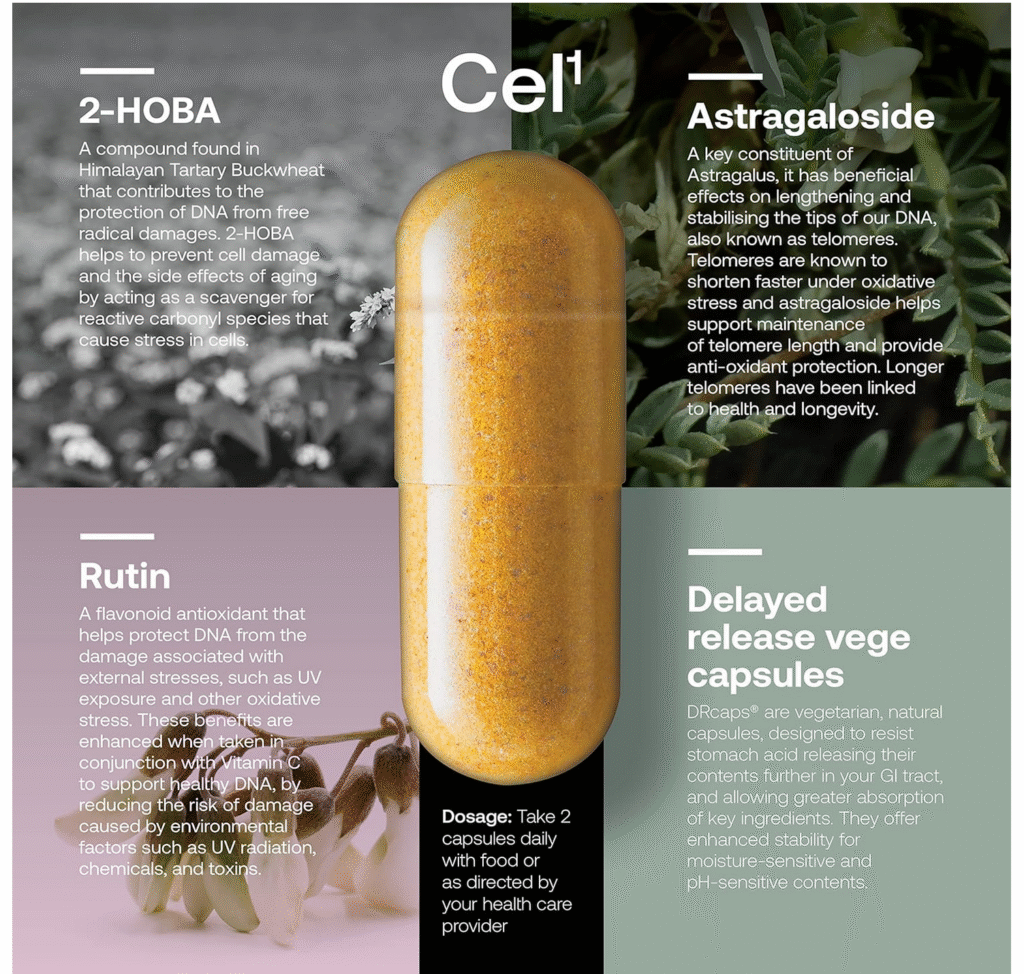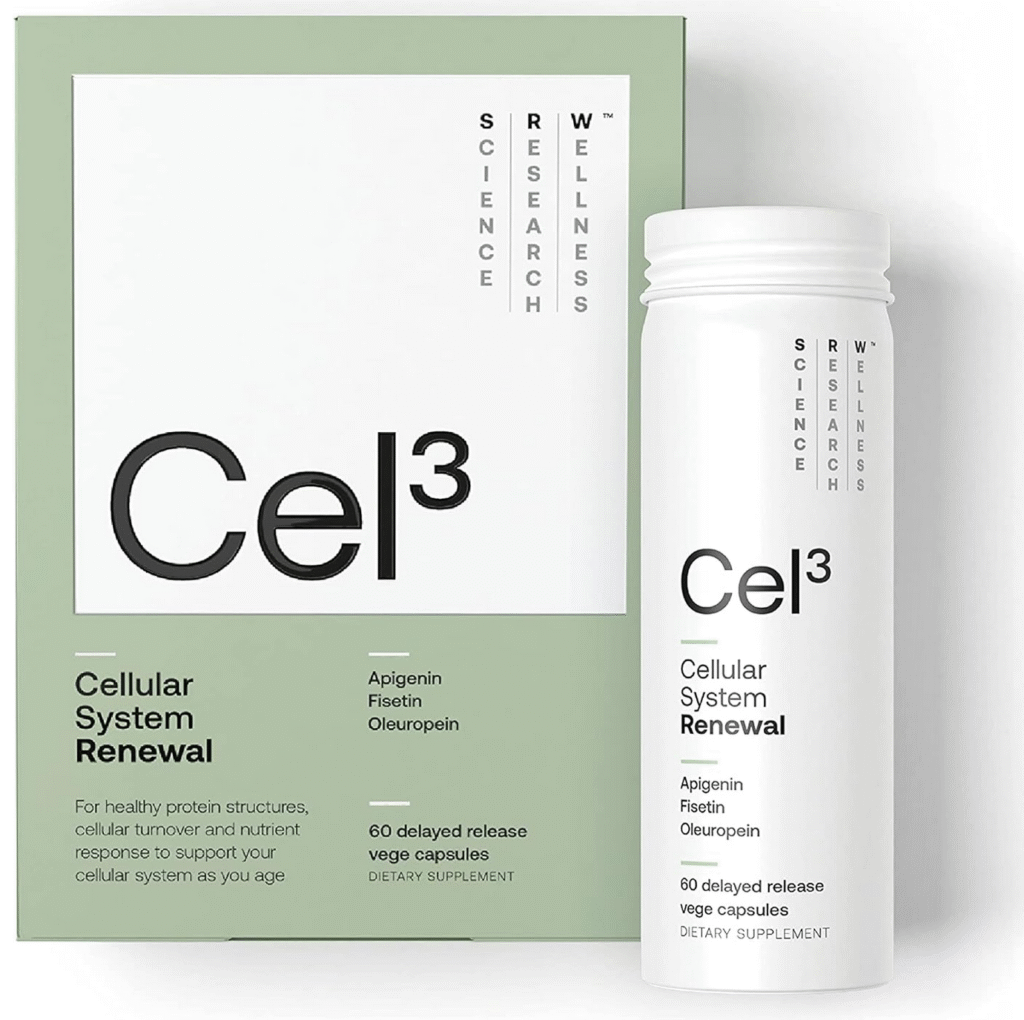Introduction
The search for ways to stay younger for longer is moving from science fiction into mainstream wellness. In recent years, biological age testing—using DNA methylation “clocks”—has given researchers a tool to estimate how fast we’re aging biologically rather than just by the calendar. Alongside this, “systems” supplements have emerged that attempt to nudge many aging pathways at once. One of the most-discussed is the Cel System, a family of products from SRW Laboratories.
In 2025, a 12-month prospective study in Aging (Albany NY) followed adults aged 54–84 who used the Cel System. The researchers reported slower biological aging on several epigenetic clocks, plus improvements in grip strength and waist circumference across the year. The design wasn’t randomized, so the results should be viewed as promising but preliminary, and they’ll need confirmation in controlled trials. Even so, it’s a rare human study linking a commercial supplement stack with biological-age markers.
What Is the Cel System?
The Cel System is marketed as a comprehensive, multi-target approach to cellular health. Instead of focusing on a single nutrient, each product is designed to address different “hallmarks of aging,” such as mitochondrial dysfunction, oxidative stress, genomic instability, and cellular senescence.
- Cel¹ Stability supports DNA stability and protection against oxidative stress. Its star ingredient is 2-HOBA (2-hydroxybenzylamine), a compound studied for scavenging reactive dicarbonyls that can damage proteins and DNA.
- Cel² Nourishment is built around NMN (nicotinamide mononucleotide), a precursor to NAD⁺, which is crucial for mitochondrial energy production. It also includes pterostilbene, a polyphenol related to resveratrol, and astaxanthin, a carotenoid with antioxidant properties.
- Cel³ Renewal contains fisetin and apigenin, flavonoids investigated for their ability to clear senescent cells and stimulate autophagy. It also adds EGCG (green tea extract), oleuropein from olives, and berberine, known for supporting glucose and metabolic pathways.
- Celᵉ Essential provides a foundation of broad nutrients, including alpha-ketoglutarate (AKG), ergothioneine, PQQ (pyrroloquinoline quinone), carotenoids, taurine, citicoline, and essential vitamins and minerals.
This layered design reflects the idea that aging is not caused by a single factor but by interconnected processes. Targeting multiple pathways at once may, in theory, produce greater benefits than a single nutrient alone.
The 12-Month Study: What Was Found?
In the 2025 study in Aging (Albany NY), adults aged between 54 and 84 took Cel System supplements daily for a year. Researchers tracked their epigenetic age using DNA methylation clocks, along with physical and metabolic measures.
Key results included:
- Participants’ biological age increased more slowly than expected. In some cases, certain epigenetic clocks even showed age reversal relative to baseline.
- Grip strength improved, which is an important predictor of functional independence and longevity in older adults.
- Waist circumference decreased, suggesting a potential impact on metabolic health.
These results sound promising, but it’s important to interpret them carefully. Because the study did not include a randomized control group, it’s not possible to know for certain whether improvements were due to the supplements themselves, lifestyle changes during the year, or a placebo effect. The researchers themselves acknowledged this limitation and recommended larger, controlled trials to validate the findings.
Still, this was one of the first published trials to show measurable changes in biological age using a commercial supplement system, making it a milestone in the emerging field of practical longevity interventions.
Why These Ingredients?
Many of the ingredients in Cel products are backed by preclinical or early human research:
- NMN has been tested in several human trials, with some showing improvements in muscle insulin sensitivity and NAD⁺ levels. Its role in supporting cellular energy and repair makes it central to Cel² Nourishment.
- Fisetin and apigenin are under investigation as senolytic compounds—nutrients that may help the body clear out dysfunctional “zombie” cells that accumulate with age. Animal studies are encouraging, though human data is still limited.
- EGCG from green tea and oleuropein from olives are antioxidants linked to cardiovascular and metabolic benefits.
- Berberine is widely studied for supporting healthy blood sugar and cholesterol levels, though it can interact with certain medications.
- AKG (especially calcium-AKG) has been linked to improved functional outcomes in small studies, and in animal research it extended lifespan.
- 2-HOBA, found in Cel¹ Stability, is less well-known but has been studied for reducing oxidative damage in preclinical settings.
By combining these ingredients, the Cel System aims to cover energy metabolism, DNA stability, senescence, mitochondrial support, and nutrient gaps—essentially providing a “systems biology” supplement stack.
How Does It Compare to Proven Strategies?
When judging any new supplement, it’s useful to compare it to interventions with strong human evidence.
For example, a large randomized controlled trial led by the National Institute on Aging in 2025 showed that omega-3 fatty acids slowed biological aging by about 3–4 months over three years compared to placebo. The benefits were even stronger when omega-3 was combined with vitamin D supplementation and resistance training. This suggests that a multi-modal approach—diet, exercise, and targeted nutrients—can meaningfully influence aging markers.
By contrast, the Cel System evidence so far is based on a non-randomized study. That doesn’t make it worthless, but it does mean the results are more tentative. If someone is new to longevity health, the most evidence-based starting point remains regular strength training, good sleep, a nutrient-dense diet, and correcting common deficiencies like vitamin D or omega-3. Once those foundations are in place, exploring advanced stacks like Cel may be reasonable.
Practical Tips if You’re Considering Cel
- Start with your baseline. Before trying advanced supplements, make sure you’ve addressed basics: vitamin D, omega-3, protein intake, sleep, and exercise.
- Choose based on goals.
- Cel² Nourishment → energy, NAD⁺, vitality.
- Cel³ Renewal → senescence and autophagy support.
- Cel¹ Stability → oxidative stress and DNA defense.
- Celᵉ Essential → broad foundation.
- Avoid duplication. Many Cel ingredients overlap with standalone supplements. Doubling up on fisetin, berberine, or EGCG could cause side effects.
- Track your progress. Functional markers like grip strength, walking speed, and energy are just as valuable as a DNA methylation test.
- Consult a professional. Because Cel contains multiple bioactive compounds, it’s important to check for potential drug interactions, especially if you take blood sugar medications, anticoagulants, or have liver or kidney conditions.
Recommended Products
When it comes to longevity supplements, quality matters. SRW Laboratories, the developer of the Cel System, formulates its products in GMP-certified facilities and provides third-party quality testing. That reduces the risk of contamination or mislabeled ingredients—a common problem with cheaper alternatives on Amazon.
Here are the Cel System products available through Amazon that we recommend:
SRW Laboratories Cel¹ Stability
Why we recommend it: Cel¹ is centered on 2-HOBA, a rare compound studied for its ability to neutralize reactive dicarbonyls that can damage DNA and proteins. Few supplements on the market contain 2-HOBA, and SRW’s formulation is third-party tested, making it one of the most reliable ways to try this emerging ingredient.
- Supports DNA stability and stress defense
- Contains rare 2-HOBA ingredient not found in most supplements
- Manufactured in GMP-certified facilities and batch-tested by third parties

SRW Cel³ Renewal 60 Capsules
Why we recommend it: Cel³ combines fisetin, apigenin, EGCG, oleuropein, and berberine, targeting senescent cells and autophagy pathways. These ingredients are often sold separately at inconsistent quality. SRW provides a clinically dosed blend, manufactured under GMP standards and independently audited for purity, which sets it apart from generic alternatives.
- Targets senescence and supports autophagy pathways
- Combines five well-researched compounds in one capsule
- Third-party tested to verify purity and dosage accuracy

Disclaimer: This post contains affiliate links. If you use these links to buy something, we may earn a commission at no extra cost to you. As an Amazon Associate we earn from qualifying purchases. Thank you for your support!
FAQ
Is the Cel System proven to reverse aging?
No. The current evidence shows associations with slower biological aging, but because the main study wasn’t randomized, we can’t be sure the supplements caused the effects. More rigorous trials are needed.
Which Cel product should I start with?
It depends on your goal. Many people begin with Cel² Nourishment (NMN-based) for energy and vitality or Cel³ Renewal for senescence support. If you want a broad foundation, Celᵉ Essential is designed for overall coverage.
Are there side effects?
Most users tolerate Cel well, but some compounds like berberine and EGCG can cause digestive upset or interact with medications. Always check with your healthcare provider first.
How long before I notice results?
In the study, changes were observed over 12 months. In real life, some people report improvements in energy or focus within weeks, while biological age shifts may take months to track.
Can I take Cel alongside omega-3 or vitamin D?
Yes. In fact, omega-3 and vitamin D are more strongly backed by clinical trials than Cel. Combining lifestyle, foundational nutrients, and advanced stacks may offer the best of both worlds.
Is it worth the cost?
Cel products are premium priced. If budget is limited, prioritize proven basics first: resistance training, adequate sleep, omega-3, and vitamin D. Cel can be considered a next step if you want to invest more in longevity support.
Conclusion
The Cel System represents one of the most ambitious supplement approaches in the longevity space today. By targeting multiple hallmarks of aging with a layered blend of compounds, it offers a systems biology approach that sets it apart from single-ingredient products. The 2025 study in Aging (Albany NY) suggests potential benefits in slowing biological age and improving strength, but because the trial wasn’t randomized, the results should be seen as encouraging but preliminary.
For now, the most reliable ways to influence aging are still the foundations of health: strength training, nutrient sufficiency, sleep, and stress management. Cel may provide an additional edge for those who already have these basics covered and want to explore innovative, multi-target strategies.
If you decide to try it, track your progress, avoid overlapping supplements, and consult a healthcare professional to make sure it fits your individual needs. The science of aging is moving fast—and Cel System is one experiment in that exciting frontier.
